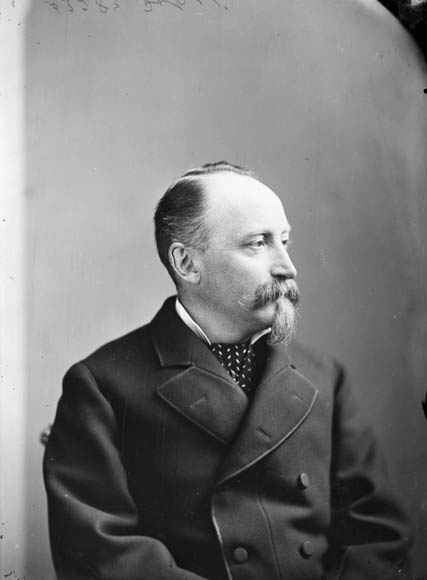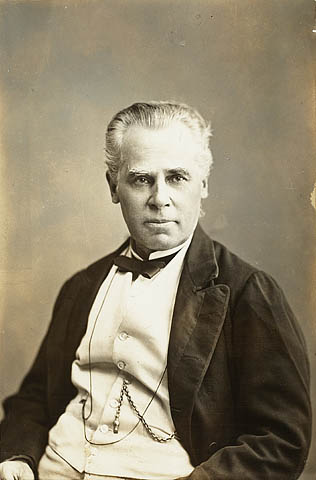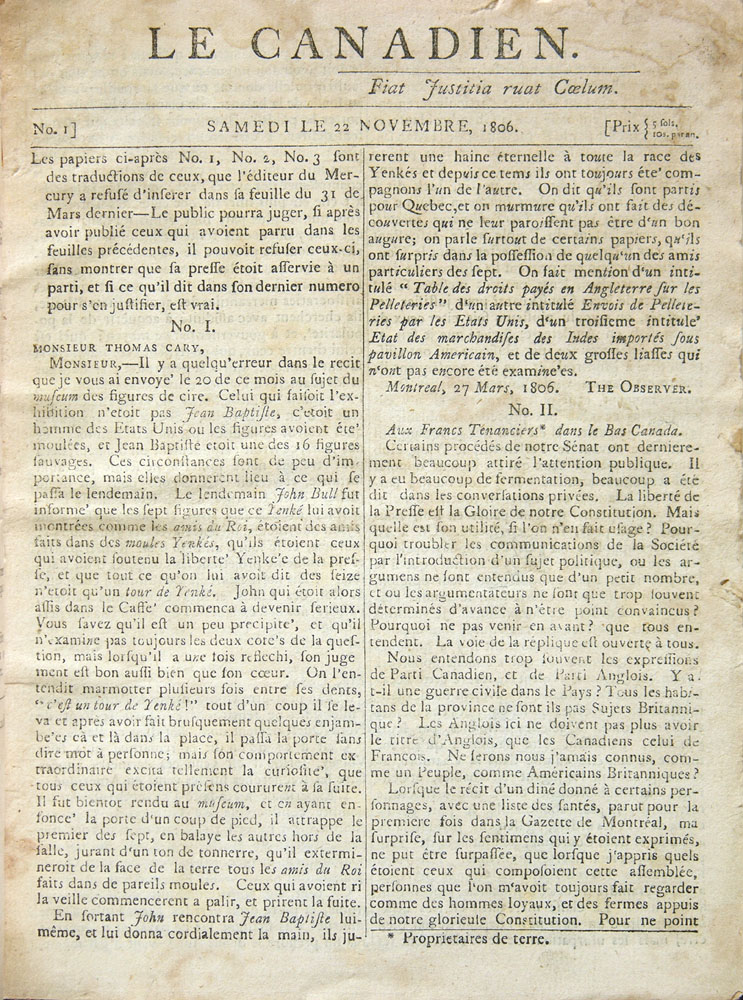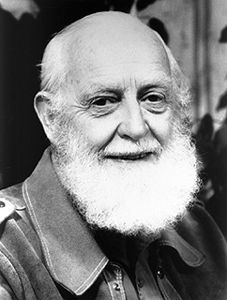
Childhood and Education
Hector Fabre was the oldest son of Luce Perrault and Édouard-Raymond Fabre, who was a bookseller, a member of the Patriotes and a mayor of Montreal. Hector began his education with the Brothers of the Christian Schools in Montreal, then went on to study at the Collège de l’Assomption and the Petit séminaire de Montréal.

From his early years, Hector was steeped in the political life of his times. Eminent Quebecers such as Augustin-Norbert Morin, Louis-Hippolyte La Fontaine, Edmund Bailey O’Callaghan and Édouard-Étienne Rodier met at his father’s bookstore to discuss politics and current affairs. His father was also a close associate of fellow Patriote Louis-Joseph Papineau. It was on Édouard-Raymond Fabre’s advice that Papineau chose exile after the failed Rebellion in Lower Canada in 1838. After having been arrested himself in November 1838, and then released, Édouard-Raymond Fabre moved heaven and earth to try to enable the exiled Patriotes to return to Lower Canada.
Politics and Journalism
Give his family background, it is no surprise that Hector Fabre became involved in politics. (In contrast, his brother Édouard-Charles, to their father’s great chagrin, chose the priesthood and eventually became archbishop of Montreal.) Fabre’s relationships with some of the most important politicians of his day—notably George-Étienne Cartier (who married his sister Hortense in 1846) and Joseph-Adolphe Chapleau—enabled him to carve out an enviable place in this world. He became a lawyer in 1856, but after completing his clerkship with his brother-in-law Cartier chose to go into journalism instead.
Introduced to the literary world at a tender age, Fabre later contributed to several important newspapers, such as L’Ordre and Le Canadien, before founding his own, L’Événement, in 1867, at age 33. From then until 1883, he was its sole proprietor. To finance this undertaking, he decided to try his hand at politics. He ran in the municipal elections in Quebec City in 1869, and then for the federal Parliament in a Quebec City by-election in 1873. He lost both races, but was appointed to the Senate of Canada in 1875 thanks to the intervention of Adolphe Chapleau. Fabre then handed the reins of his newspaper over to journalist and musician Nazaire Le Vasseur.
Agent General for Quebec and Canada in Paris
Over the ensuing years, Fabre travelled frequently to Europe (England, Switzerland, and France). He may have played a role in the negotiations surrounding the founding of Crédit foncier franco-canadien (a mortgage company modeled on Crédit de France) in Quebec in 1880. In the summer of 1881, Quebec premier Adolphe Chapleau (1879–1882) went to Europe seeking foreign investment to develop the province’s mining and agriculture sectors and complete the Quebec section of the railway on the north shore of the St. Lawrence River. Chapleau came home convinced of the importance of Quebec’s having a permanent representative in Europe, because of the growing role that European capital was coming to play not only in the province’s development, but also in the colonization plans that concerned French, Belgian and Flemish farmers.
On 4 March 1882, the Lieutenant-Governor of Quebec approved the Quebec Executive Council’s decision of 28 February appointing Hector Fabre as Agent General of Quebec in Paris (see Diplomatic and Consular Representations). Premier Chapleau gave him an economic mandate, making him the accredited representative of Quebec for all negotiations arising from matters under the province’s jurisdiction. In the months that followed, Chapleau made a surprising return to the federal scene as Secretary of State in the government of John A. Macdonald. To cover the costs of Quebec’s office in Paris, Chapleau convinced the federal government to use Fabre’s services as well. Thus, in summer 1882, Fabre became the Canadian government’s representative in Paris, resigning his Senate seat to do so. He continued to represent both Quebec and Canada in Paris until his death in 1910.
Promoting Investment and Immigration Opportunities
Fabre’s appointment as Agent General in Paris gave him new opportunities to exercise his journalistic talents. In 1884 he began publishing Paris-Canada, a magazine that continued to appear more or less regularly until 1909. It played two important roles: promoting Canada to prospective European investors and immigrants and providing Canadians in Europe with news of home. Fabre also made several lecture tours throughout France and helped to build close ties in French political circles.
In promoting immigration to Quebec, Agent General Fabre had to operate somewhat discreetly. Since the mid-19th century, Quebec had been experiencing massive emigration to the United States and the provinces of western Canada (see Franco-Americans). To offset this outflow, Quebec’s nationalist élites suggested stimulating immigration from French-speaking countries in Europe. Since 1870, the Quebec government had been widely distributing a brochure to attract new immigrants. Entitled La Province de Québec et l’émigration européenne (the province of Quebec and European immigration), it had a first print run of 80,000 and was reprinted several times. Responding to these efforts, Fabre worked actively to promote Quebec and Canada; he travelled the roads of France and strived to win the support of members of the French Catholic clergy. But France was experiencing significant population loss itself at the time; French law prohibited any propaganda in favour of emigration, so Fabre had to proceed cautiously. Nevertheless, his efforts bore fruit: Canada welcomed nearly 2,000 French immigrants in 1910.
Promoting Canadian Arts and Culture in Paris
In addition to providing information about Canada and promoting its economic interests in France, Fabre fostered cultural interactions between the two countries. In 1887, he established the tradition of an annual Saint-Jean-Baptiste Day celebration in Paris. In October 1893, he founded La Boucane, a society that offered entertainment to Canadians living in Paris.
Fabre’s son Paul also played a significant role in the cultural activities of the first permanent office of Quebec and Canada in Paris. As secretary and then editor-in-chief of Paris-Canada, he founded a theatrical and artistic circle called Le Gardenia, transforming the Agent General’s office into a genuine cultural centre that made its influence felt throughout Paris’s artistic community. Artists, businessmen, students and politicians flocked to what was soon to be known as the Canadian commission. Hector Fabre regularly received visits there from prominent Canadian politicians such as Quebec premier Honoré Mercier (in 1888 and 1891) and Sir Wilfrid Laurier (in 1897 and 1902).
Legacy
Hector Fabre received various honours in the course of his career. He became a Fellow of the Royal Society of Canada in 1882, a companion of the Order of St. Michael and St. George in 1886 and a Knight of the Legion of Honour in 1887.
Fabre’s death in Paris on 2 September 1910 marked the end of Quebec representation in Paris for the next 50 or so years. (Dr. Philippe Roy succeeded him in 1912 as Commissioner General for Canada, but did not represent Quebec.) Quebec had an official representative in London from 1911 to 1936 and in Brussels from 1914 to 1933, but it was only in the aftermath of the Quiet Revolution that the province established its network of general delegations abroad—the first in Paris in 1961 and the second in London in 1962. Quebec also opened an economic office in Milan in 1965.
As of 2017, Quebec had seven general delegations (the highest level of its offices abroad, in Brussels, London, Mexico City, Munich, New York, Paris and Tokyo) offering services in the areas of the economy, education, culture, immigration and public affairs. The province also had five delegations, eight bureaus, six trade offices and two areas of representation in multilateral affairs. As of that same year, Canada had diplomatic and consular offices in over 260 cities in some 150 different countries.

 Share on Facebook
Share on Facebook Share on X
Share on X Share by Email
Share by Email Share on Google Classroom
Share on Google Classroom



